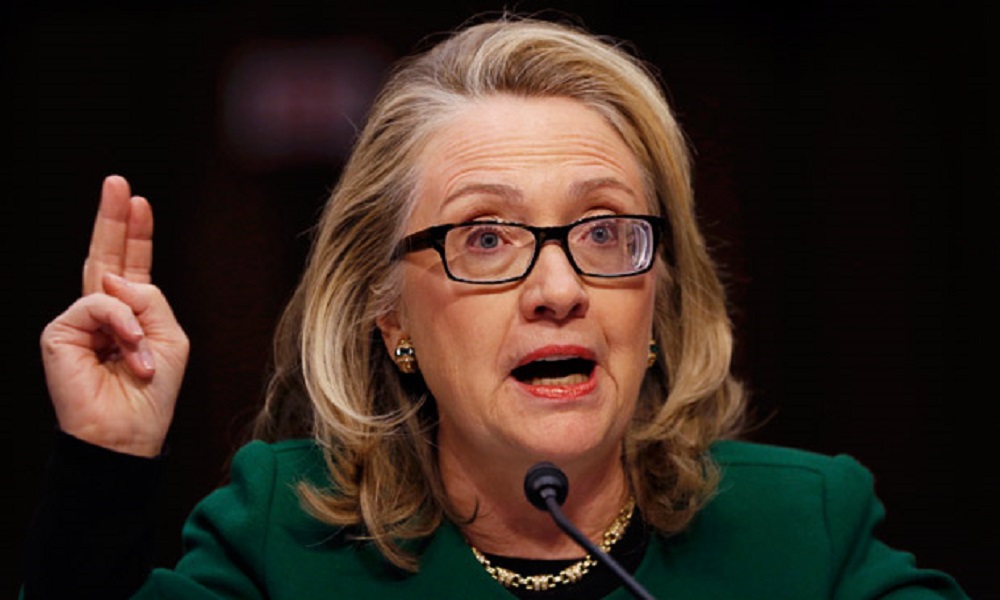
(THE WASHIGTON POST) – Hillary Clinton has told some whoppers. But Wednesday night on “PBS NewsHour,” she outdid herself wit
Let’s recall that the Obama-Clinton team first insisted they tried, but the Iraqis would not agree to grant troops immunity. That failed on several grounds. First, the hang-up came when the Obama administration insisted that immunity be confirmed (unnecessarily) by parliament — where it was highly controversial. Now, when Iraq is coming undone at the seams, the president has reversed himself and claimed that verbal assurances on immunity for U.S. troops are good enough for now. If good enough now, it should have been good enough in 2011. Second, the White House had whittled down the military’s troop request to a mere 3,000, which the Iraqis understood was worthless. Liz Cheney, who served in the State Department under President George W. Bush and is now heading a pro-defense group, Alliance for a Strong America, with her father, former vice president Dick Cheney, told me: “She has apparently forgotten that the military commanders requested nearly 20,000 stay behind forces. President Obama said no. The military then asked for 10,000. President Obama said no. President Obama said he would leave no more than 3500 troops in Iraq, an amount everyone involved knew was insufficient, and was not surprisingly rejected by [Prime Minister Nouri al-Maliki].” It is bizarre to claim that the troops “had” to be out when Clinton was trying – unsuccessfully — to retain a stay-behind force. Clinton’s failure to impress upon the president the importance of a significant force and to negotiate a deal with Iraq under whatever circumstances existed represents a key failure – one that has directly contributed to the rise of the Islamic State of Iraq and Syria (ISIS) and the collapse of the Iraqi military.
So for “PBS NewsHour” Clinton tried out a new tale: “Certainly when President Obama had to make the decision about what to do, he was deciding based on what the Bush administration had already determined, because they were the ones who said troops have to be out by the end of 2011.”
This is patently untrue. The Bush team had always intended that there be a follow-up to the SOFA that was in place while it remained in office. Multiple senior officials from the Bush team have confirmed this over the years. Clinton’s own actions in attempting to negotiate a follow-on deal were the direct result of that understanding.
Eric Edelman, the undersecretary of defense for policy in the Bush administration, told Right Turn: “Yes, the SOFA agreement set a Dec. 31 2011 withdrawal date. But everyone assumed, and many senior Iraqis told us at the time, that a follow on residual force would be necessary. Then Iraqi Defense Minister Abdul Qadr, for example, said publicly that without a continued US presence it would be ten years before the Iraqis could control their own air space.” He recalled, “Ambassador [Ryan] Crocker, who negotiated the SOFA is on the record saying the deadline was set but everyone assumed that the SOFA would be superseded by a follow-on agreement that would allow for some continued US presence the size and composition of which was to be determined.”
Edelman’s recollection is correct. At the end of the Bush administration, Crocker is quoted as saying in an Associated Press story in 2010 that it was “profoundly” important for troops to stay behind after 2011. At an event at the Brookings Institution in 2012, Crocker recalled that the argument Maliki made at the time the first SOFA was negotiated was that “look, you know, we have got to take the [fear of U.S.] occupation argument away from our common opponents. And the way we do that is we say date certain, and then we renegotiate down the line. And he was right on the first because we concluded the agreements. They went before parliament, the Sadrists kicked up a fuss. Every other bloc, party, and member voted for both agreements. And, you know, the occupation argument died the day that that agreement saw light. Okay, then when we went to phase two, which was renegotiating the [SOFA] agreement. . . .” A number of news outlets have confirmed these facts over the years.
To say the Bush team contemplated or mandated a complete troop withdrawal – after insisting for a number of months that the reason there was no deal was because of the Iraqis – is, even for the Clintons, an indefensible misrepresentation. The Bush team never, ever said troops “had” to be out by a certain date. The game plan for the Bush team and the Obama team was to conclude a deal; Clinton and her boss failed to do so.
Clinton also insisted that it is “impossible” to know what would have occurred had there been a SOFA negotiated. On one level, that is true because history doesn’t provide us with a parallel universe, but recall that no sooner than U.S. troops were out that Maliki returned to his sectarian ways, threw Sunnis out of the military and quickly faced new sectarian violence and Iranian meddling. Put it this way: Iraq had a chance for continued peace and stability of the type Obama praised in 2009 if U.S. troops had remained – as they did in Europe and Japan after World War II — as a stabilizing force. Without them it was predictable – and just about every conservative who had supported the surge did predict it – Iraq was in for a very, very hard time.
The Clintons seem unaware that the rules of a political campaign and 24/7 media coverage are far different from what they were in the 1990s and even in 2008. Literally every word uttered in public (and some in private) they say is recorded and picked over. Hillary Clinton’s ability to get away with gross misrepresentations, be they about her lifestyle or her record, is much less than she may imagine. (Even in 2008, her “bullets over Bosnia” fable got her in hot water.)
Clinton might consider correcting the record on this one. It’s a distortion that is both lame (Bush’s fault!) and untrue. As Liz Cheney observes, “Secretary Clinton is in a tough spot. Her legacy and viability depend upon her ability to rewrite the history of the Obama Administration foreign policy, at precisely the moment its disastrous consequences are unfolding across the Middle East.” Indeed, Clinton’s newest excuse suggests that she can’t defend her record on the facts. And maybe she can’t.













 e poi
e poi